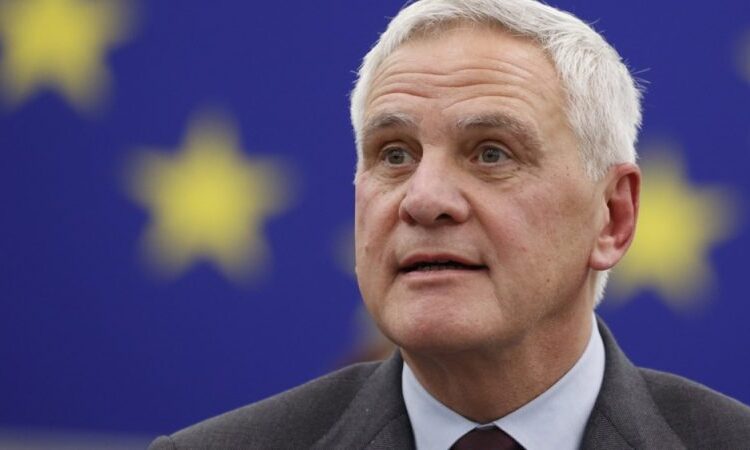
The European Investment Bank is open to financing defence industries but is still reluctant to go beyond dual-use technology, a top EIB official told Euractiv, warning also that the idea of using eurobonds to finance military industry must be carefully weighed as they may not attract investors.
The EIB vice-president for security and defence, Kris Peeters, also said there was room for “concrete cooperation” between the bank and NATO, but warned that generally, investors were wary of the defence industry at the moment, despite governments’ interest in supplying Ukraine with weapons and replenishing their stocks.
“The war in Ukraine is not convincing funds and pension funds to invest more in defence and security,” he said in an interview on Thursday 25 January).
“On the contrary, a Dutch study [by the Fair Money Guide] shows they invest less. This means we must be very, very careful.”
“That is the reason the dual-use approach is a very important criterion that we cannot throw away,” Peeters said, dismissing the politicians’ push for the bank to get involved in funding arms and ammunition and boosting production and end its long-standing policy of sticking to dual-use products only.
EU leaders first put the issue on the table in the spring of 2022, a few months after Russia’s aggression against Ukraine, and most recently in December, as well as by the defence ministers in November.
On that issue, Peeters was adamant: “I’m not convinced finance is the only problem, but procurement, national security, and the fact that there are not enough projects that we can finance [are]”.
Former Competition Commissioner Margrethe Vestager was open to taking risks as she was competing for the EIB top post. This week, Alexander Stubb, a frontrunner in Finland’s presidential race, said the EIB should invest in arms.
Internal Market Commissioner Thierry Breton also called on the bank to “support the EU’s policies”.
The bank’s governors – the 27 EU finance ministers – have until now refused to change the institution’s statutes, as they do not want to lose the perfect ‘AAA’ credit rating.
Peeters said private investors are reluctant to take the risk and questioned why the EIB should be open to this kind of investment, suggesting that defence may not be a financially sound choice for the bank and expressing caution about ideas to use eurobonds to fund such activities.
Tricky defence investments
“Show me the projects and we will see whether we can finance them,” Peeters said bluntly, calling on the defence industry to come to the bank with proposals.
“When it’s ammunition and weapon systems, we are very clear: we cannot do that. For many other things… we can discuss,” the vice-president added.
As an example of where the EIB can invest, Peeters referred to tech solutions, and armies’ priorities in robotisation, communication, artificial intelligence, and drones.
NATO-EIB cooperation
In a move to improve the defence industry’s access to investment opportunities, Peeters said he was working on aligning different exclusion lists in the field of security and defence of five National Promotional Banks, which channel EIB funds to local companies for small-scale projects in the EU.
So far, the EIB has “not yet” taken the initiative to commercial banks, “but there can be a big discussion about their definition” of security and defence, he added.
Peeters also said he had suggested to NATO to jointly organise a financial colloquium “where the financial sector can explain the current state of play”.
Asked how cooperation between NATO and EIB would work, Peeters said the European Investment Fund “is in close contact” with the NATO Innovation Fund on developing concrete cooperation between their activities”, with announcements to follow in February or March.
Careful with Eurobonds
On the recently floated idea of using Eurobonds to fund defence, Peeters repeated that he is “a little bit worried that institutional investors are not buying bonds that are linked with defence”, referencing the Dutch study.
“The problem is that pension funds and so on are not willing to invest in this kind of bonds – that can be changed of course, you can try it – I’m not against it – but I’m warning that it will not be an easy task.”
“Each idea must be examined, of course,” Peeters added.
European Council President Charles Michel first mentioned the idea, supported by Estonian Prime Minister Kaja Kallas, and French President Emmanuel Macron.
Finance Commissioner Johannes Hahn said “It is a very understandable great idea”, but “the current legal framework is not sufficient enough for this idea to be implemented”. Breton said the EU should take more investment risks, mentioning guarantees.
[Edited by Zoran Radosavljevic]





